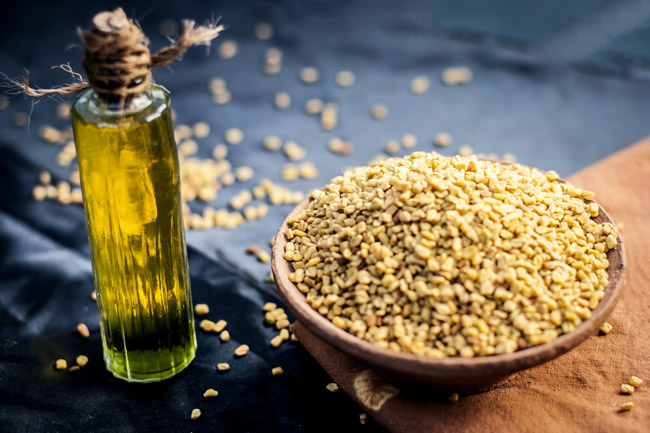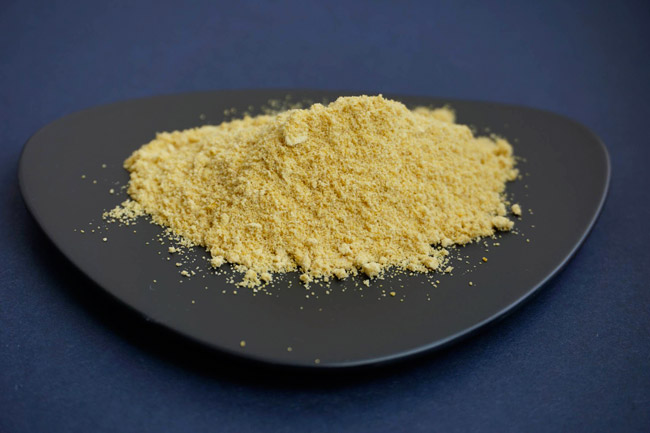Used for millennia, fenugreek is known to regulate blood sugar levels in diabetes or pre-diabetes. It also promotes digestion and helps in fat loss thanks to its effect on insulin spikes. Ask your doctor for advice if you want to take fenugreek for diabetes.
Athletes consume fenugreek thanks to its action on muscle gain and mass gain.
Pregnant women use fenugreek in late pregnancy and after childbirth to support milk production and recover after childbirth. They should, however, avoid consuming fenugreek during pregnancy as the spice can cause uterine contractions.
Fenugreek is a natural spice widely used by athletes, convalescents and women who are breastfeeding. There are many uses for this substance and there are many beliefs, whether justified or not, associated with it. If you have any doubts about fenugreek and its use, you will get all the answers in this article.
Is the fenugreek spice a plant or a seed?
Before we start to present the effects of fenugreek and the different reasons why you can use it, it is interesting to already know if fenugreek is a plant or a seed.
Fenugreek is a plant originally found in the Middle East and Turkey. It is a plant that is part of the fabaceae family (like peas or beans). When unearthed in its wild state, it is a plant that measures between 20 and 50 cm in height. This plant is easily recognizable by its yellow seeds with a strong odor. These seeds were used in particular in spicy dishes. Still called Greek hay, this plant has been used since antiquity. During the death of a pharaoh, for example, the Egyptians put it in the tombs. In China and India, this plant is nowadays used for the preparation of dishes, but also of medicines: fenugreek powder, fenugreek capsule, fenugreek seeds, everyone will find the format that suits them.

History of fenugreek, an unknown spice
Fenugreek is one of the ancient medicinal and culinary plants in human history. As stated previously, the Egyptians already used its aromatic properties at the time of the pharaohs, approximately 1500 years before this era, to embalm the dead and to successfully purify the air of houses and places of worship. About 1000 years later, the doctor Hippocrates will speak of it as a soothing remedy.
In addition to digestive properties , it was also credited with the ability to fight inflammation and reduce rheumatic pain. From the 7th century AD, this plant began to be cultivated in the Middle East and was introduced soon after to China and India. Fenugreek was also quickly incorporated into traditional medicine in China and into the Ayurvedic pharmacopoeia, along with Rhodiola rosea and ashwagandha.
To find fenugreek, you have to favor countries with mild climates, because that’s what this plant prefers. It is found in the wild in North Africa, in fields, rockeries and scrubland. This plant is widely cultivated in Egypt, China, India, Argentina, France or Lebanon, in the Mediterranean regions.
Composition of organic fenugreek
The seeds and leaves of organic fenugreek (trigonella foenum graecum) are used in herbal medicine. The seeds of this plant contain a high rate (40%) of mucilaginous fibers and a lower percentage (3%) of steroids saponins . These are known for their surfactant roles and are associated with the regulation of cholesterol.
If this plant and its seeds are also beneficial for health, it is thanks to their composition. In each fenugreek seed, you will find 30% protein, 20% carbohydrates and 10% fat. The plant also contains vitamins A, B and C1 , sulfur, calcium, magnesium, phosphorus, antioxidants, nicotinic acid, alkaloids and lecithin.

The benefits of fenugreek
Fenugreek has many health benefits.
Fenugreek and diabetes
Among the many treatments available in traditional medicine against diabetes and cholesterol, we find the consumption of fenugreek. Fenugreek has been shown to help maintain normal blood glucose levels to prevent. It can therefore help prediabetics or people suffering from type 2 diabetes, either mild to moderate.
According to the numerous studies carried out in relation to the effect of fenugreek on diabetes, it even helps to lower and regulate the level of insulin while reducing insulin resistance in patients with type 2 diabetes.
Finally, the seed is also rich in soluble fibers, which exert an action on the blood glucose level by delaying digestion. As a result, the rate of sugar absorption decreases in the intestines and thus fenugreek helps maintain normal blood sugar levels as part of a healthy lifestyle.
In order to benefit from the effects of fenugreek on blood sugar, it is advisable to consume the equivalent of 90 mg of saponins per day. As a reminder, saponins are the active ingredients contained in fenugreek seeds.
You will find at Nutripure an extract of fenugreek standardized to 50% fenugreek (trigonella foenum graecum), thus ensuring a normal level of glucose in the blood.
Fenugreek
- check Target: blood sugar, insulin resistance, fat loss, digestion
- check Fenugec helps maintain normal blood glucose levels
- check Blood sugar regulation prevents insulin spikes and limits fat storage
- check 120 capsules of 600mg titrated at 50% saponins (1 month)
- check Dosage: 4 capsules day in the evening after the meal
Fenugreek and appetite
In cooking, this plant, often used as a spice, is regularly recommended for people with a small appetite or who have difficulty eating .
For people who have difficulty gaining weight only, fenugreek promotes appetite when the person begins to consume between 1 and 4 capsules of fenugreek per day. VS This spice does not, however, increase the appetite of people without appetite problems . Indeed, fenugreek being an adaptogenic plant, its role will only be to trigger the appetite when our body lacks it. It will not induce an increased appetite under normal circumstances.
Does fenugreek make you fat?
By itself, fenugreek does not make you fat. However, for people with a weak appetite , fenugreek promotes appetite, it will help these people to eat more and therefore gain weight. These effects will not be felt in people who already have a normal appetite. As this plant is an adaptogen, its effects will adapt to your body: it will not increase your appetite if your body is not limited by your lack of appetite.
Fenugreek, breast and breastfeeding
Fenugreek is used by pregnant women to support milk production and postpartum recovery. In addition, its use would lead to better nutritional quality milk. and more pleasant in terms of taste.
To benefit from it, breastfeeding women must take 2 capsules of a fenugreek-based food supplement each day.
Results are usually seen after 3 days. However, for a lasting effect, it is best to continue taking fenugreek for the duration of breastfeeding.
Some women also consider fenugreek as a solution to increase breast size in a natural and healthy way. However, it is important to remember that the effect of fenugreek is more pronounced in women with small breasts, while it has almost no effect on women who already have large breasts. To make the breasts gain volume, women can use fenugreek in 5 forms: powder, seeds, oils, creams and capsules. We do not have any studies to confirm these properties.

Fenugreek in bodybuilding
As stated above, fenugreek is made up of 30% protein.
In addition, the plant has another very useful property for sports enthusiasts and for people who do bodybuilding. It has an action on muscle mass gain . Fenugreek is indeed an appetizing plant: it therefore increases appetite. Its high saponin content helps stimulate the appetite of the person generally having difficulty in gaining mass.
To facilitate mass gain through increased appetite, we recommend taking 4 capsules per day.
Fenugreek and digestion
Thanks to its composition rich in fiber, fenugreek promotes digestion .
To benefit from the effects of fenugreek on digestion, we recommend consuming 4 capsules of fenugreek extract per day.
Fenugreek and fat control
Fenugreek is recommended for weight loss because it has the property of helping to support and balance the metabolism of fats .
To promote the effectiveness of fenugreek on fat control, we recommend taking between 1 and 3g of fenugreek powder per day.
Fenugreek and cholesterol
Fenugreek has been shown to help control cholesterol. We therefore recommend consuming fenugreek as part of a balanced diet so that it helps control lipid metabolism (cholesterol and triglycerides).
In order to promote the effectiveness of fenugreek on cholesterol, we recommend consuming 2.5 g of fenugreek seed powder in the form of capsules, twice a day for 3 months, or 100g of fenugreek seeds reduced in powder with reduced bitterness, divided into 2 doses.
Is fenugreek good for the hair?
Fenugreek is used for many reasons in Ayurvedic medicine, but it also helps stimulate hair growth. Thanks to the vitamins present in the seeds of this plant, it is possible to use it for in the context of hair loss.
However, we do not have studies to confirm the interest of this use.
Fenugreek oil is made from ground seeds. The seeds naturally contain active ingredients in small quantities. The oil will not be very effective unless you swallow it (which is not very pleasant, given its slightly bitter taste).
If you want to benefit from the full effects of fenugreek, benefit from its beneficial effects on health like regulating the blood sugar level, increasing the level of milk or any other reason to be in better shape, it is better to prefer an extract fenugreek titrated in saponins .
Are the powdered seeds of the fenugreek spice effective?
As we have said, fenugreek is a condiment used in the preparation of dishes, but also and above all as a medicinal product in many traditional medicines. It is a complete food supplement.
However, to benefit from the wonderful effects of the plant, you must transform the seeds into powder or at least grind them , otherwise the body will not digest them well and will evacuate them without absorbing them or almost. Therefore, they will have little effect. It is not recommended to consume the seeds directly, as they are very hard and you will get a toothache if you try to eat them directly.
It is possible to buy fenugreek powder directly, but this is not very recommended, because this powder easily undergoes rapid oxidation and does not keep well. Therefore, it will quickly lose its health benefits. Fenugreek seeds are therefore effective as long as you grind them yourself. This is how you can enjoy all their properties .
To get fenugreek powder from the seeds, you can use an electric grinder, hand grinder, food processor, blender or blender.
Is fenugreek extract in capsules more effective?
Fenugreek capsule extract is the best form of fenugreek to benefit from its effects. The fenugreek extract having a standardized level of active principle, you precisely control the amount of saponins you consume.
Fenugreek capsules are more effective if you want to gain weight or to benefit from the medicinal properties of the plant . We recommend taking 4 capsules of 600mg of fenugreek standardized to 50% saponins.
It’s the same principle as for turmeric: turmeric is an excellent spice that contains 3 to 4% of the active ingredient, curcumin. If you want to benefit from the health benefits of turmeric, it is better to turn to a curcumin extract.
Fenugreek: dosage and dosage
We recommend taking 4 capsules of fenugreek extract per day .
It will be necessary to distribute the catches between the meals of the day. On Indian territory, fenugreek seed is consumed daily throughout the year, sometimes in very large quantities, up to 10g per day. It is important to remember that the dosages vary according to the particular needs of each organism. It is therefore possible to do 4-week cures with a one-week break every month.
It is recommended to take fenugreek preferably in the morning , at noon and in the evening during the meal.
Precautions for use of fenugreek (trigonella foenum graecum)
Like any product used in medicine, both traditional and modern, there are precautions to be taken to avoid creating problems for the body when using this substance.
In traditional medicine, fenugreek seeds are used in some cases to induce uterine contractions and allow a pregnant woman to give birth easily. Therefore, as a precaution, pregnant women are recommended to avoid consuming fenugreek in amounts that would exceed the usual dietary doses. This avoids any possible risk of “miscarriage” or of inducing labor prematurely.
Also, if you want to use fenugreek for diabetes , it is best to take advice from your doctor beforehand. Self-medication for diabetes can cause serious problems. When you start treatment to change your blood glucose level, it is important to monitor your blood sugar very closely. You should also tell your doctor, if necessary, how to review the dosage of traditional hypoglycemic drugs he may have prescribed.

Contraindications
In principle, there are no contraindications to the consumption of fenugreek. Therefore, anyone can use it: children, nursing mothers, etc. Just be especially vigilant in case of pregnancy or diabetes. However, every body is unique, so your body may have a different reaction than you expect if you consume it. Therefore, it is important to listen to your body and not to continue taking it if side effects appear. We recommend starting the intake gradually, with 2 capsules for a week for example, the time to let our body get used to it.
Undesirable effects
Consuming fenugreek is generally safe , but in some cases it can cause unwanted effects depending on the compatibility with your body.
If you opt for fenugreek powder as found in stores, taking large amounts can cause gastrointestinal upset, which is usually transient, due to the high fiber content of these seeds.
